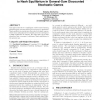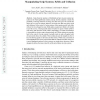118
Voted
NETCOOP
2007
Springer
15 years 7 months ago
2007
Springer
We consider jamming in wireless networks with transmission cost for both transmitter and jammer. We use the framework of non-zerosum games. In particular, we prove the existence an...
ESA
2007
Springer
15 years 7 months ago
2007
Springer
In this paper we study a game where every player is to choose a vertex (facility) in a given undirected graph. All vertices (customers) are then assigned to closest facilities and...
97
Voted
FOCS
2007
IEEE
15 years 7 months ago
2007
IEEE
We present efficient approximation algorithms for finding Nash equilibria in anonymous games, that is, games in which the players utilities, though different, do not differentia...
118
Voted
FOCS
2007
IEEE
15 years 7 months ago
2007
IEEE
d Abstract) Kousha Etessami LFCS, School of Informatics University of Edinburgh Mihalis Yannakakis Department of Computer Science Columbia University We reexamine what it means to...
124
Voted
GLOBECOM
2008
IEEE
15 years 7 months ago
2008
IEEE
— We consider the issue of fair share of the spectrum opportunity for the case of spectrum-overlay cognitive radio networks. Owing to the decentralized nature of the network, we ...
109
Voted
ATAL
2009
Springer
15 years 7 months ago
2009
Springer
This paper introduces a multiagent reinforcement learning algorithm that converges with a given accuracy to stationary Nash equilibria in general-sum discounted stochastic games. ...
112
click to vote
WINE
2009
Springer
15 years 7 months ago
2009
Springer
We study an economic setting in which a principal motivates a team of strategic agents to exert costly effort toward the success of a joint project. The action taken by each agent...
100
Voted
AMMA
2009
Springer
15 years 7 months ago
2009
Springer
Abstract. Game-theoretic analyses of distributed and peer-to-peer systems typically use the Nash equilibrium solution concept, but this explicitly excludes the possibility of strat...
106
Voted
QSHINE
2009
IEEE
15 years 7 months ago
2009
IEEE
Abstract. In this paper, a radio resource sharing scheme for wireless cellular network is investigated to achieve efficiency and fairness among base stations. We propose a credit-t...
119
Voted
STOC
2003
ACM
16 years 1 months ago
2003
ACM
We introduce a simple network design game that models how independent selfish agents can build or maintain a large network. In our game every agent has a specific connectivity requ...



